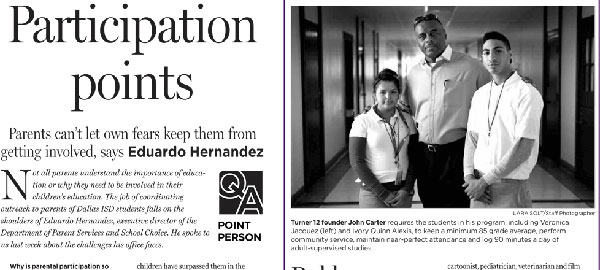This article originally appeared in the Dallas Morning News.
Nothing focuses an audience’s attention like the voice of authority, and there is no question that John Carter, a coach at Lincoln High School in South Dallas, has it when he calls together students and parents for the monthly meeting of his Turner 12 group. His command of the room shows parents that they need to be the ones in control, while students get the message that it’s time to sit up, listen and learn.
At the sound of Carter’s voice, the room instantly falls quiet. He asks everyone to stand, and with minimal prompting, parents and students alike recite the group’s mantra in unison: “Whatever you can visibly imagine, whatever you can sincerely believe, whatever you can ardently desire, whatever you can enthusiastically act upon, it will inevitably come to pass.”
Carter founded the Turner 12 a decade ago with an eye toward guiding parents and their children to work as a team with a focus on excellent grades and college graduation. The program started with 12 middle school students from the 294-unit Turner Courts public housing project in South Dallas. It was an environment full of bad role models and precious few examples of success. Carter says he checked statistics and found that, in the entire decade before he began the program, only six kids from Turner Courts had attended college.
All of the original Turner 12 graduated from high school, and 11 went to college. Over the years, Carter has gradually raised the performance bar. Parents and students sign a contract pledging to meet rigorous standards. Students must keep a minimum 85 grade average, perform year-round community service, maintain near-perfect attendance and commit to 90 minutes a day of adult-supervised studies.
I’ve seen similar programs in private and charter schools around the country, but they are a rarity in mainstream public schools, especially in low-income communities like South Dallas. Carter’s work is extraordinary, especially when you consider that he began Turner 12 long before the nation awoke to high-profile, community-transformation models such as the Harlem Children’s Zone in New York. A common thread among them, though, is a focus on keeping parents engaged in their children’s academic lives.
Carter’s inspiration was twofold. First was a desire to shake the education establishment out of its lethargy. As a sports reporter for the now-defunct Dallas Times-Herald, Carter recalled feeling appalled after meeting a teacher whose main attraction to her job was her three-month vacation she got each summer. He decided to leave journalism to become an educator.
Carter also recognized a need for something to break a mind-set among disadvantaged youths that college and success were beyond their reach. He wanted to prove that low-income kids could excel at school, go to college and be whatever they wanted to be. His current group of high school seniors list among their career goals: psychologist, cartoonist, pediatrician, veterinarian and film director.
At their monthly meetings, he invites guest speakers and instructors to teach students what they need to succeed in life. Students work on writing and resume preparation, and they constantly practice their public speaking skills. The guest speakers provide a motivational message or offer advice on how to impress college recruiters.
Parental attendance is mandatory. “For the parents to be in the meeting with that kid, I think that speaks volumes to the child,” Carter says. “Kids in this area don’t see parents” consistently demonstrating an active interest in their children’s lives.
The requirement of parental participation “shows kids that their parents really do care about their education and … want to make sure they take advantage of every opportunity,” says Brenda Alexis, whose son, Ivory Quinn Alexis, is on track at Lincoln to graduate as salutatorian in the spring. Ms. Alexis describes the program as “invaluable” and credits it with exposing students to a world of possibilities far beyond South Dallas.
Kimberly Miles, whose son, Keaton, plans to attend the University of West Virginia on a basketball scholarship, says the community service component helps keep the students focused on their mission. Her husband, Steve Miles, works with juvenile offenders and has long required community service to help his own children remember what’s at stake.
That exposure to less fortunate kids, she says, “kind of helps them to see what’s going on and to say, hey, this is what can happen if you make the wrong choice.”
Tod Robberson is a Dallas Morning News editorial writer. This column represents his personal views. His e-mail address is trobberson@dallasnews.com.

